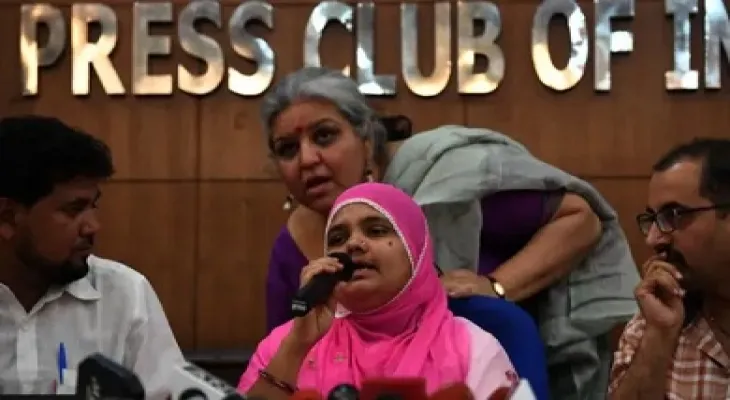Search here
Newspaper
Search here

Arab Canada News
News

Published: January 9, 2024
The Supreme Court of India said that 11 men who were released early after being convicted of raping a pregnant Muslim woman should be sent back to prison.
The men, who were part of a Hindu mob, were serving life sentences for attacking Bilkis Bano and killing 14 members of her family during anti-Muslim riots in the state of Gujarat in 2002.
However, they were released in August 2022 by order of the Gujarat state government. Their release and the celebrations as they left prison sparked global outrage.
Note that this article contains details that some readers may find disturbing.
Bilkis told the Supreme Court in her petition that the men's release "shook the conscience of society."
She described the rape incident as "one of the most heinous crimes the country has ever witnessed," and said their release left her "completely shocked."
The two-judge bench of the Supreme Court, headed by Justice BV Nagarathna, said that the state of Gujarat "is not competent" to issue a pardon in the case since the men were tried and convicted in a court in the neighboring state of Maharashtra.
The bench added that since the government’s order granting the pardon has been quashed, the 11 convicts must return to prison within two weeks.
Justice BV Nagarathna said that justice includes not only the rights of prisoners but also the rights of victims, and that the "primary duty" of the court is to uphold justice and the rule of law.
She added: "The rule of law must be upheld irrespective of repercussions and consequences."
This historic ruling is expected to have repercussions, especially in Gujarat, where Indian Prime Minister Narendra Modi was chief minister at the time of the riots and faced criticism for not doing enough to prevent the massacre.
Modi has always denied any wrongdoing and has not apologized for what happened during the riots.
The state of Gujarat had supported the release of the men convicted of attacking Bilkis Bano and her family.
Officials in court said the men, first convicted in a trial court in 2008, had spent more than 14 years in prison and were released after considering various factors such as their age and good conduct in prison.
The state government said it sought approval from the federal government, which was granted by the Ministry of Home Affairs, led by Amit Shah, a close aide of the Indian Prime Minister.
When the men were released in 2022, they were greeted as heroes as they left prison in the town of Godhra, Gujarat, where their relatives offered sweets and touched their feet to show respect.
Federal prosecutors said they should not be "released prematurely nor shown any leniency as their crime was heinous, grave, and serious."
Bilkis Bano said, days after her attackers were released, that the decision "shook her faith in justice."
She wrote to the Gujarat government, saying: "How can justice end like this for any woman? I trusted the highest courts in our country. I trusted the system, and I was slowly learning how to live with the trauma I endured," and she appealed to the state government to "reverse this harm."
The attack on Ms. Bano and her family was one of the worst crimes during the riots, which broke out after the deaths of 60 Hindu pilgrims in a fire on a passenger train in the town of Godhra.
Hindu mobs blamed Muslims for setting the fire and attacked Muslim neighborhoods. More than 1,000 people were killed, most of them Muslims.
On the morning after the train fire, Ms. Bano, who was then 19 years old and pregnant with her second child, was visiting her parents in a village called Randhikpur near Godhra with her three-year-old daughter.
When the rioters attacked the village and began setting fire to Muslim homes, she and 16 relatives fled, she told the BBC in 2017. Over the following days, they took refuge in mosques or relied on the kindness of Hindu neighbors.
On the morning of March 3, 2002, a group of men attacked them "with swords and sticks."
Bilkis told the BBC: "One of them snatched my daughter from my arms and threw her on the ground, hitting her head with a rock."
Her attackers were neighbors, men she saw almost daily growing up, who tore her clothes and raped her, ignoring her pleas for mercy.
Her cousin, who had given birth two days earlier, was raped and killed, and her newborn child was also killed.
Bilkis Bano survived because she lost consciousness and her attackers left, believing she was dead. The two children aged seven and four were the only other survivors of the massacre.
Her struggle for justice has been long and nightmarish. Some police and state officials tried to intimidate her, evidence was destroyed, and bodies were buried without autopsies. All of this was well documented.
Doctors who examined her said she was not raped and received death threats.
The first arrests in the case were not made until 2004, after the Supreme Court of India handed the case to federal investigators and transferred her case to Mumbai, saying Gujarat state courts had failed to deliver justice to her.
Courts have convicted dozens of people over the years for their involvement in the riots, but some prominent accused received bail or were acquitted by higher courts.
Among them was Maya Kodnani, a former minister in Modi’s Gujarat government, whom the court described as a "leader of the riots" in one area.
In 2013, the Supreme Court panel ruled there was insufficient evidence to prosecute Mr. Modi, who became prime minister the following year, but many have continued to criticize and blame him for the riots that occurred during his tenure as chief minister.
Comments